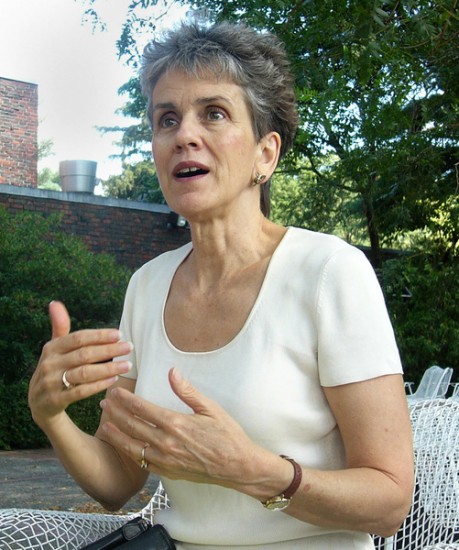On Thursday, March 3, Francis Moore Lappé gave a talk titled “From Famine and Fruit Loops to Food Democracy,” officially kicking off the Goodwin-Niering environmental conference called, “Smart Growth?””
Government Professor Jane Dawson calls Lappé “a crusader for food justice.” Lappé is most known for her book Diet for a Small Planet. Originally published in 1971, it is now sold in over fifteen languages. “This is the book that first revealed the realities of our unhealthy and unjust food system. Francis was way ahead of her time,” said Dawson.
Before launching into her discussion of world hunger despite a huge abundance of food on the Earth, Lappé began with her motto: “It is far too late and things are far too bad for pessimism.”
She attributes the problem of hunger to what she calls a “maligned mental map.” In our heads, we see a great lack of both goods and goodness. We perceive the world as not only having a food deficit, but also seeing our neighbors as selfish and competitive. Our mental map is so convoluted that we cannot see the abundance of food on the planet.
“We end up creating the very lack [of resources] we say we fear,” she said.
In fact, she said, we have enough food on the Earth to make us all chubby and still have leftovers. The fact that a large amount of corn harvest goes towards vehicle consumption illustrates her point. “Why,” she asked, “am I a part of a system that is taking the abundance of this Earth and shrinking its capacity to feed us?”
Lappé said humans come equipped with genetic traits of cooperation, such as empathy and fairness, yet studies show that under certain conditions, normal people are brutal to one another. Much of this brutality stems from our mental map.
“We can’t see outside of the way we frame the world, and we have created a mental map that creates the very conditions that bring out the worst in us,” Lappé continued.
When faced with major problems like world hunger, humans tend to turn to others to establish their fate, notably politicians and the economic market. We relegate our problems to the “magic of the market” and our elected officials, rationalizing that conditions created by the market are less than ideal, but the best option. In refusing to take responsibility for our problems, we create negative social conditions like extreme concentrations of power, lack of transparency and our reliance on the blame game.
To solve this problem, Lappé wagers that we need to bring out the pro-social qualities inherent in human beings through what she calls “living democracy.”
“Living democracy” is exemplified in India, a country currently experiencing a high-tech boom which has created many billionaires. The rest of the population lives behind this façade. Between 40-50% of Indian children have stunted growth due to malnutrition. This is what we see on our mental map. We don’t see the 100,000 village cooperatives, organized by village women, that are creating 1/5 of the milk in India, and have created four to five times more jobs than the technology boom.
“Why haven’t we known about this?” Lappé asked. “Because we haven’t bothered to look. Instead of playing the blame game and waiting for people to solve their problem for them, these people are doing it themselves.”
If we take the idea of “living democracy” seriously, we have to ask ourselves how we are creating power in our own lives, being transparent and mutually accountable for our actions.
Lappé said this will take courage. “Part of the courage is understanding the power we have and rethinking our notion of fear,” she said. When humans feel fear, we associate it with the idea that we are in the wrong place at the wrong time, but we must eventually come to accept that feeling fear may just mean we are doing the right thing.
“Make a list of things that ten years ago, you thought could never happen, and then did,” Lappé said. “If you keep a list of doubts and acknowledge that you were wrong, you realize that it’s not possible to know what is possible.”
Lappé used the psychological concept of mirror neurons to illustrate the power of student activism. Mirror neurons exist in the brain and fire signals both when we act and when we observe an action performed by another person. “If you are doing something edgy on this campus, someone will see it and recognize it.” In other words, the mirror neurons in that person’s brain will be mimicking the action.
Merry Byrne ’13 reflected on Lappé’s discussion, “Food and democracy are often separated from one another. We have more than enough food to feed the world population, but the concentration of power in the world system prevents anyone from having adequate access to food sources. It is a really powerful thought. We have the resources to solve hunger, but the world system we have created prevents this ideal from being a reality.” •










